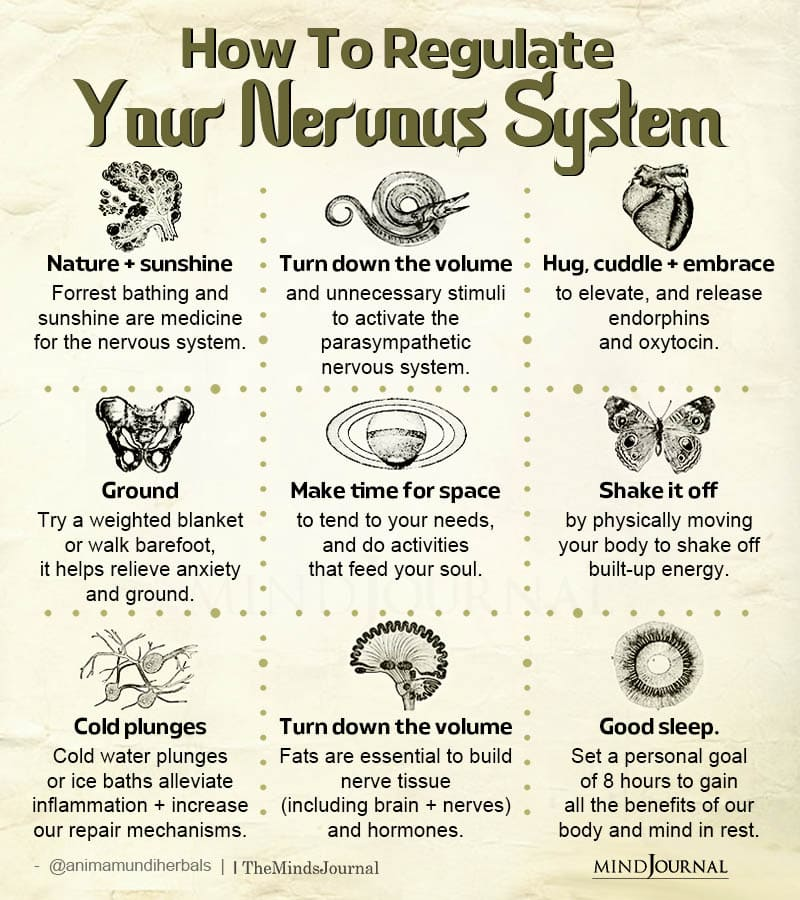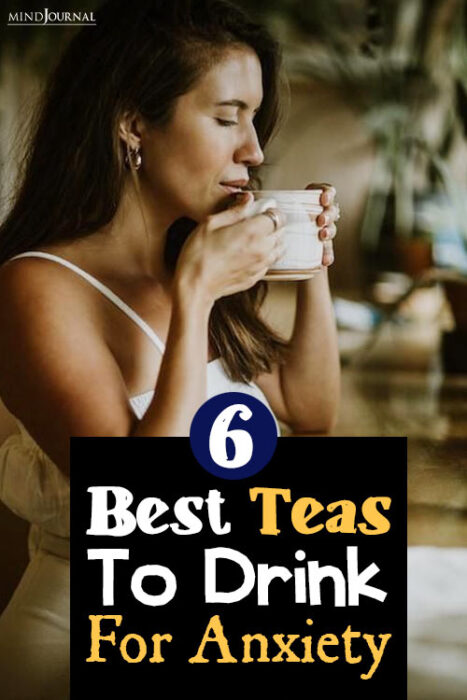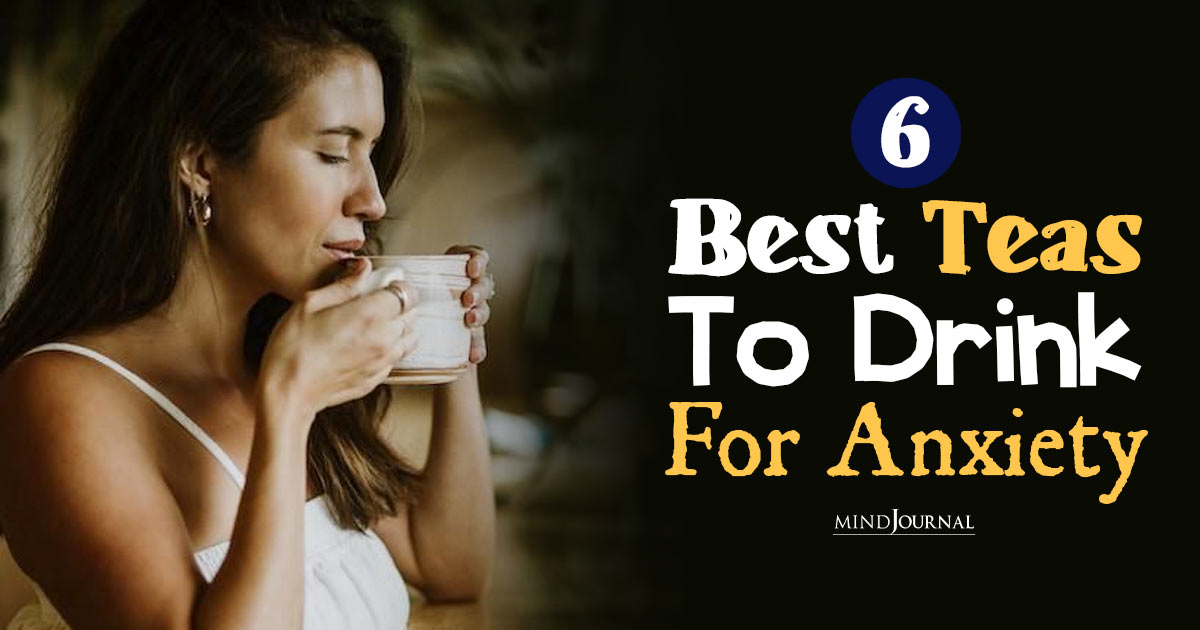Are you feeling a bit wound up, tensed and on edge lately? Anxiety can be a real buzzkill, however, there is a very simple thing you can do to deal with it. Have some tea! Yes, that soothing elixir has been sipped for centuries to calm the jitters and ease the mind. Today we are going to explore some of the best teas to drink for anxiety.
The benefits of tea are enormous and widely-known, however there are some teas which can be a huge help for you, if you deal with anxiety often. In this article, we’ll spill the tea on the six best teas to drink for anxiety.
So, grab your favorite mug, get cozy, and let’s explore the world of herbal remedies that’ll have you saying, “Anxiety, who?”
Related: 13 Ways To Quiet A Worried Mind
What Are The Benefits Of Tea?
- Teas calm and relax you: Many herbal teas have natural calming properties that can help in reducing stress, anxiety, and promote relaxation.
- Teas work excellently as a digestive aid: One of the best benefits of tea is that it can soothe your digestive system, get rid of indigestion, bloating, and also support healthy digestion.
- Teas help you to sleep peacefully: Certain herbal teas have been used for centuries to promote better and deeper sleep. They can help calm your mind and prepare your body for a restful night.
- Teas help in boosting your immune system: Another one of the major benefits of tea is that it is known for their immune-boosting properties. They can strengthen your immunity and aid in fighting common illnesses like, common cold and flu.
- Teas have anti-inflammatory properties: Many herbal teas have an anti-inflammatory nature that can help reduce inflammation in your body and give relief from symptoms of inflammatory conditions.
- Teas can hydrate and detoxify your body: Herbal teas are typically caffeine-free and can be a great way to stay hydrated. Certain herbal teas have diuretic properties that can support gentle detoxification by promoting better urine flow.
As with any herbal remedy, it’s important to consult with a healthcare professional, particularly if you have any underlying health conditions or are taking medications that may interact with certain herbs.
Okay, now that we know the benefits of tea, let’s find out the best teas to drink for anxiety.
6 Best Teas To Drink For Anxiety
1. Peppermint Tea
If you’re looking for a caffeine-free drink, that’s also one of the best teas to drink for anxiety, then I would place my bets on peppermint tea. It’s a personal favorite, and trust me, this works!
People have been enjoying it for ages because it’s sweet, tasty and healthy. Peppermint leaves contain oils like limonene and menthol that do wonders for your overall wellbeing. Drinking peppermint tea can help with digestion, soothe cold and cough symptoms, reduce headaches, improve your clarity and also boost your energy level.
Simply steep the leaves or tea bags in hot water for about five minutes, and then remove them before drinking. Since peppermint tea doesn’t have any caffeine, you can enjoy it at any time of the day.
2. Lavender Tea
Lavender often shows up in a mix of herbal teas or even on its own. With around 47 varieties growing worldwide, English lavender is typically what ends up in your cup of tea giving it that floral sweetness thats loved by so many.
Lavender tea is famous for making you feel relaxed and calm and is one of the best things to have, if you struggle with anxiety often.
For ages, lavender tea has been a favorite amongst people when it comes to reducing stress and anxiety. It also helps you to sleep well, improves your mood, reduces pain and strengthens your immunity. Oh, it’s also pretty great for your gut, which makes it an amazing bedtime drink!
Related: Butterfly Hug Method: 6 Remarkable Benefits of Hugging Yourself for Anxiety Relief
3. Passionflower Tea
Passionflower tea is one of the most underrated and best teas to drink for anxiety. It offers you various health benefits such as enhancing relaxation and improving your sleep quality. It’s also packed with antioxidants that help lessen inflammation.
This flower is great for easing everyday stress and anxiety. Moreover, it’s beneficial for those battling depression or suffering from insomnia or disrupted sleep.
On top of that, passionflower tea can also help boost your metabolism, alleviate symptoms of menopause, and reduce pain. And don’t worry, it has no caffeine, so no jitters too!

4. Chamomile Tea
For ages, chamomile tea has been the go to herbal remedy for many people, and it’s considered to be one of the most ancient medicinal plants ever in the history of mankind.
The chamomile flowers are rich in flavonoids and terpenoids which have massive healing effects. Chamomile tea is also great for dealing with muscle spasms, inflammation, haemorrhoids, period cramps, gastrointestinal distress and insomnia.
Packed with antioxidants, it has a naturally sweet flavor. Many people choose to sip on some chamomile tea before hitting the sack because it helps them feel sleepy and relaxed, and can ensure you of a good night’s sleep.
5. Black Tea
Black tea is enormously popular for a reason, and all over the world, people enjoy this form of tea. One of the best teas to drink for anxiety, black tea is rich in antioxidants that can improve your heart health, keep your blood sugar stable, reduce the chances of a stroke and even balance your cholesterol levels.
Black tea contains caffeine and an amino acid called l-theanine, and when they work together, they’re known to help sharpen your mind and increase focus.
Drinking black tea typically makes you feel more alert and energized, and some studies even show that it can help in dealing with depression, mood swings and anxiety.
6. Licorice Root Tea
For thousands of years, licorice has been a popular ingredient around the world, especially China.
Licorice root has a naturally sweet and refreshing taste that reminds you of those licorice candies we used to gorge on as kids. Due to it’s anti-viral properties, it’s a great option to deal with cough and cold.
Some studies say that it’s one of the best teas to drink for anxiety, and it does a great job in calming you down. It also helps in reducing cortisol in your body, which in turn helps you in tackling chronic stress.
Related: Mind-Body Harmony: 7 Powerful Somatic Exercises For Anxiety That Will Heal You
Takeaway
These herbal teas offer a wide range of benefits as you can see from above. These are some of the best teas to drink for anxiety and stress, and speaking from personal experience, each one of these work.
Whether you’re seeking a calming cup of tea before bed or want to have a soothing sip to ease the restlessness you feel, incorporating these teas into your routine can be a delightful and healthy addition to your lifestyle.









Leave a Reply
You must be logged in to post a comment.